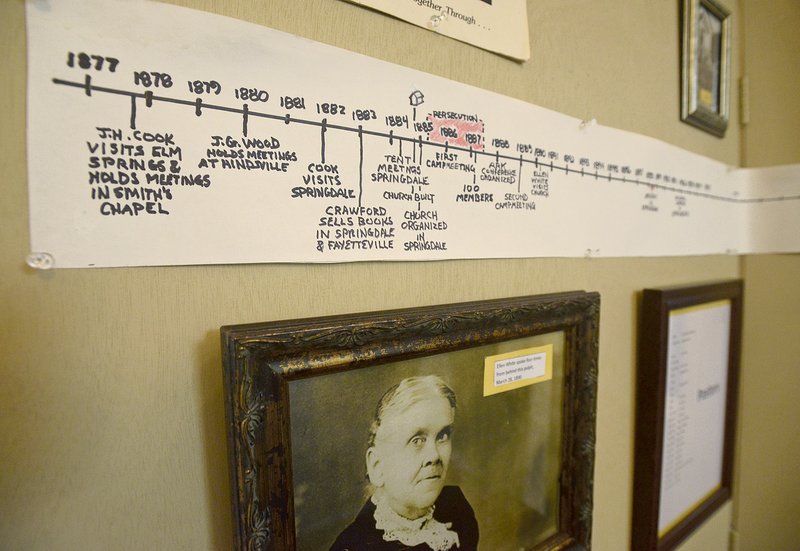In June 1844, a freight train rolled into Springdale, population 500. Among the unloaded freight were two tents from Michigan -- a 40-foot circular tent and a small family tent. Dr. D.A. Wellman and his wife and J.W. Scoles and his wife had already arrived from Battle Creek, Mich.
-- Memoir of Mrs. W.F. Martin
Springdale Adventist Fellowship
What: Heritage Day
When: 10:30 a.m. and 6:30 p.m. today
Where: 4001 Don Tyson Parkway
Information: 751-5817
at 50th anniversary of church
The Springdale Adventist Fellowship, a Seventh-day Adventist congregation, celebrates that beginning with a Heritage Day event today. A worship service begins at 10:30 a.m. with Steve Orion, president of the Arkansas-Louisiana Conference of the Seventh-day Adventist Church, and many former ministers will attend. Activities at 6:30 p.m. today will include a history of the church and reenactment of some scenes.
Those tents in 1844 were erected on a lot owned by Joseph Holcomb where Bank of America now stands on Emma Avenue, just west of the Arkansas & Missouri Railroad Depot, according to Billie Jines, whose history is part of the collections of the Shiloh Museum of Ozark History in Springdale.
"This caused some excitement in town, for it was supposed a circus was coming to town," reads Martin's memoir, which was published in a July 1935 edition of the church's The Youth Instructor. "But they soon learned it was not a circus, but a religious meeting was to be held by these men who were Seventh-day Adventist ministers."
"Townsfolk wondered, 'What kind of people would use tents to bring a strange message to an already religiously devout community?'" wrote Ross Hinshaw, a current member of the church who also researched its history. Hinshaw is the director of the Men's Ministry of today's church.
Two Seventh-day Adventist families already were settled in Springdale when the tents arrived: Those of Z. Swearingen and Enos Crawford. "The citizens of Springdale considered these to be honest and upright families, but their religious beliefs were ... odd," Hinshaw said.
ADD THE GOOD
The first Seventh-day Adventist Church in Arkansas was established in Springdale by 1885, followed by the first Seventh-day Adventist School in 1902, Hinshaw recorded.
A statewide conference for the 10 Seventh-day Adventist congregations in Arkansas was formed in May 1888 and seated in Springdale.
"The Seventh-day Adventist Church (SDA) is a Protestant denomination characterized by its observance of the biblical Sabbath (Saturday), its emphasis on the imminent second coming of Jesus Christ, and its fundamental creed, 'The Bible, and the Bible alone,'" according to an entry in the online Encyclopedia of Arkansas.
The Springdale congregation -- with approximately 350 members -- meets each Saturday. The message deals with the coming of Christ, "and we do believe we are in the last days of the end time," said Juan Fresse, pastor.
"But we also believe we need to make a difference in our community while we are here," Fresse continued. "Someone here asked the question, 'If our church were to close down, would anybody know we are not here? Would anyone know that we were gone?'"
The Springdale Adventist Fellowship offers programs for junior and senior high youth and operates the Springdale Adventist Academy, serving 42 students from prekindergarten through eighth grade. The congregation is considering adding a hot meal to the town's schedule of free meals and also planting a church in western Fayetteville.
Additionally, Pastor Charles Heam works with the congregation's Marshallese members and is trying to translate the Bible into the Marshallese language.
The church also operates an organically certified greenhouse to fund the school. Produce is sold to local stores and given to the underserved, Fresse said.
"We try to focus on healthy living," said Freese, listing another of the Adventist traditions. The health ministry of the church provides information, seminars and more. "We are trying to help as many different segments of the population. We want to 'add the good' to people's lives and habits."
"Jesus came to give them life, and 'that they might have it more abundantly,'" Fresse quoted John 10:10.
GROWTH
"The tent was filled with curious listeners," the Jines history of that first meeting continues. "D.A. Wellman preached on 'the Word of God.' This man's sermons were so different, that the crowd increased night after night ... The sermons continued into August."
"Dr. Wellman preached a powerful, spirit-led sermon titled, 'The Word of God,'" Hinshaw wrote. "Also, these tent people led the audience in songs that were different from any heard before -- each song carried a message straight to the heart.
" ... the whole county was astir. People came long distances in wagons. Farmers who had followed the plow all day were not too weary to attend meetings in the evenings."
During these early meetings, 74 people signed "the covenant, promising to keep all 10 commandments (including keeping the Sabbath as Saturday)," Jines reported. Most were baptized northwest of town in what was then known as Stultz Mill Pond but is now called Shiloh Springs.
"The people from the best families in town signed a covenant," Hinshaw reported. Signing the covenant did not mean the people were ready for baptism and church membership, he insisted, but a company was organized.
This growing congregation met in a rented "dwelling house" in the northwest part of town, where they held their regular services. They built a church on land donated by Joe Holcomb near where the tent had stood, Jines wrote.
Hinshaw noted that first church building was completed by Sept. 23, 1884, as a 26- by 40-square-foot building. "Less than 1,000 square feet," Fresse pointed out.
Jines listed early members of the church: Swearingen, David Allen, Porter Owenby, Simons Weswel, J.A. Armstrong and William Martin.
"An important principle of the church being the observance of the seventh day, Saturday, as the Sabbath, the church began finding itself in the noisy business part of town as the town's business area engulfed its location," reads an undated newspaper article in the Shiloh Museum's research files. "It was decided best to sell the lot and move the church house to a quieter location on West Grove Street. That building was remodeled and expanded to include two additional rooms in 1969."
Other locations were built as the congregation grew, one east of town on what today is U.S. 412, opened in 1983, and at the current location on Don Tyson Parkway, dedicated in 2012.
SUNDAY LAW
In August 1884, Wellman returned to Springdale, expected to organize a church in Springdale. But he was stricken with typhoid fever, taken to the Swearingen home, died Sept. 2 and was buried in Springdale's Bluff Cemetery, just inside the original gate entrance, Hinshaw said.
"His sorrowing friends who had listened to his stirring sermons thought his rest would be but for a few short months, perhaps, for it seemed to them that the coming of Jesus was just at hand," Mrs. Martin wrote. "It was not realized then how many things must come before that great event."
The state of Arkansas had a "Sunday law" from the dawn of its history, Hinshaw explained. The law made it illegal to work on the Sabbath -- considered to be Sunday by most Christian faiths.
But the law had an exemption, Section 1886, which allowed work on Sunday if the worker was a member of a religious group that marked the Sabbath on another day -- such as the Seventh-day Adventists. The exemption was allowed as long as a person took one day a week away from work.
"But in 1885, the exemption clause was repealed by the state, supposedly intending to close saloons on Sunday," Hinshaw wrote. "But no saloon keepers were arrested and tried. Only Saturday Sabbath keepers were brought to court as violators of Sunday. At least 20 such cases are on record in the state of Arkansas."
Hinshaw listed several in the area:
Springdale, F.N. Elmore, arrested April 1886 by Deputy Sheriff Holcomb for digging potatoes in J.A. Armstrong's garden.
Fayetteville, James Pool, arrested twice for digging potatoes on Sunday. Fined $30.90 for the first offense and $28.40 for the second.
Hindsville. William Fritz, a woodworker, fined for working in his shop on Sunday, $28.
Springdale. Elder J.W. Scoles (one of the pastors for the first tent meeting), for painting that original church building on Sunday in 1885. This case was appealed to the Supreme Court, which upheld the circuit court's decision, Hinshaw recorded.
"Many people were horrified at such religious persecution, which continued for more than two years," Hinshaw wrote. "In 1887, an Arkansas state senator, R.H. Crockett, grandson of Davy Crockett of Alamo fame in Texas, introduced a bill to restore the exemption for Sabbath keepers," with an impassioned speech before the legislature.
The bill passed, and Elder T.A. Jones, president of the Missouri conference overseeing the work in Arkansas, called for a day of thanksgiving.
NAN Religion on 05/21/2016


